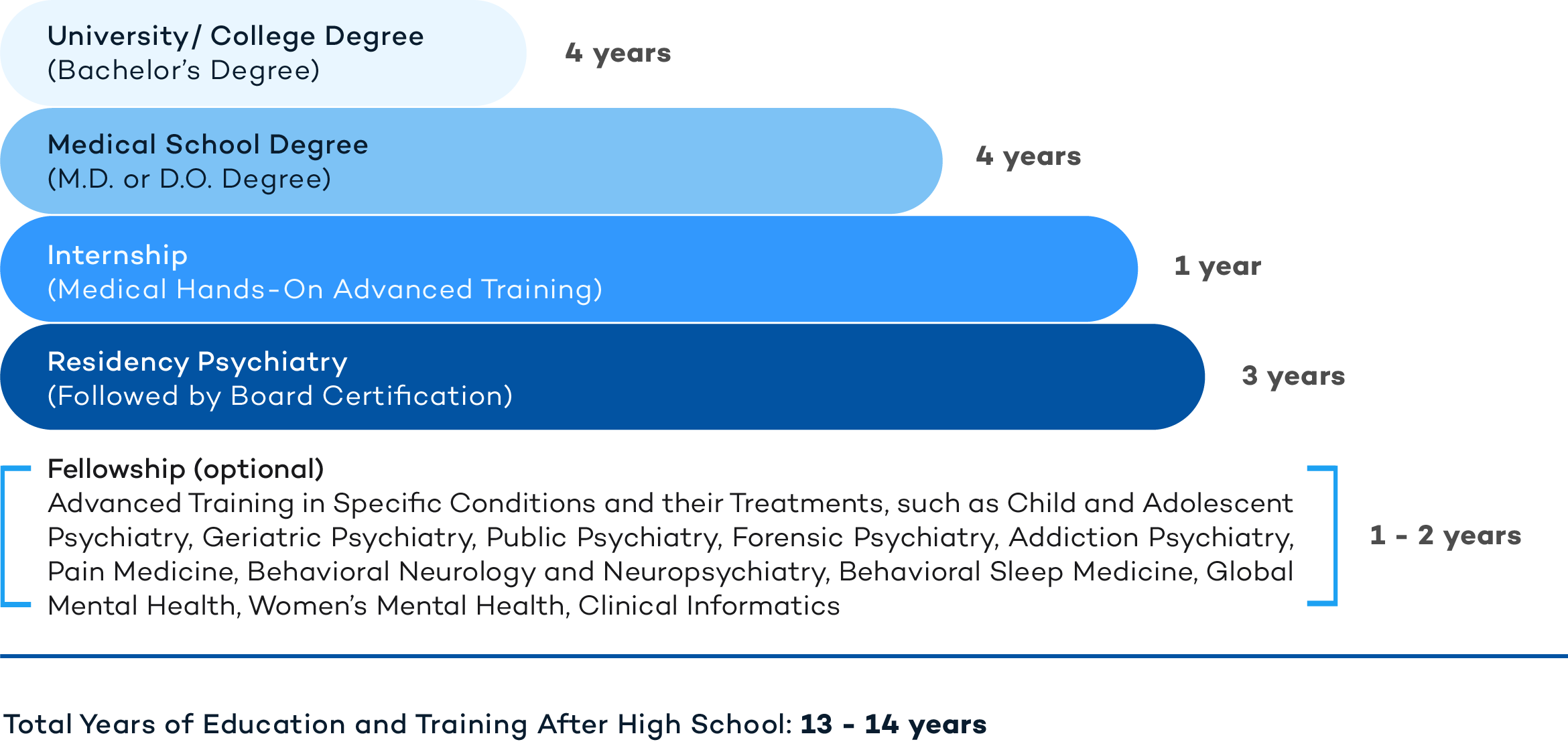

A Psychiatrist is a Board-Certified Doctor who treats and diagnoses all conditions pertaining to mental health, focusing, among others, on: the detection of mental illnesses, the treatment of learning disabilities, and the management of substance use disorders. Psychiatrists can order or perform a full range of medical laboratory and psychological tests as part of their comprehensive mental health evaluation of the patient.
The level of expertise to treat a specific condition and the credentials necessary are important factors when choosing the right physician. You may do your diligence and check the credentials and practice style of your doctor with the help of your family and friends. At myDoqter, we facilitate this process by providing you with access to patient feedback about doctors, as well as to the professional recommendations given by other physicians who have witnessed first-hand the expertise and professional competency of your Psychiatrist.
Psychiatrists are doctors (M.D. or D.O.) with advanced medical degrees and training. The following is a representation of the years of education and training that a Psychiatrist has undergone.

PSYCH from the Greek word ‘psykhē’ for ‘soul’ and IATRY from the Greek word ‘iāsthai’ for ‘to heal’.
A Psychiatrist will treat an extensive list of conditions related to mental health and substance use, including:
Depression: A serious medical condition causing a feeling of sadness and loss of interest for previously enjoyed activities. Symptoms may include feeling sad, changes in appetite, thoughts of suicide or death. Psychiatrists are equipped with the knowledge and diagnostic tools to assess and treat Clinical Depression, and to address the factors that may worsen this condition. In addition, there are established as well as many novel medical treatments that can be specifically tailored to the patients suffering from depression, providing a significant relief of their symptoms. (*If you experience thoughts of suicide, please contact the National Suicide Prevention Lifeline at 1-800-273-8255, or visit SuicidePreventionLifeline.org)
Post-Partum Depression: This condition may affect as many as 20% of women after giving birth, and there is a wide range of severity of symptoms, from mild to severe depression which may result in suicide. Pregnancy is a natural biological state for women during which there is a massive buildup of hormones, particularly progesterone, in their body. With childbirth, and the hormonal changes that follow, many women feel an ‘unexplained’ feeling of sadness after giving birth to their baby. Also known as the ‘baby blues’, post-partum depression is a real medical condition and must be addressed promptly by seeking the help of a psychiatrist. There are therapies, medications and new innovative treatments for depression that can help women during this time. You can learn more about this condition in the myDoqter blog.
Alzheimer’s Disease: The most common type of dementia in the U.S., it afflicts 5.5 million Americans and it is among the top 5 causes of death for adults age 65 and older. Alzheimer’s disease is characterized by a group of symptoms that lead to a decline in mental function and a disruption of daily life. Symptoms may include difficulty with short-term and long-term memory, problems with decision-making abilities and judgement, confusion, inability to learn new information, as well as personality and behavior changes (depression and loss of interest in previously enjoyed activities). Although there is no cure for Alzheimer’s disease at this time, a number of medications can slow its progression, as well as reduce the symptoms associated with this condition. Psychiatrists and scientists are working together to find a cure for this disease and many advances have been made. Most recently, a biotechnology company has shown promising results in investigational models using CRISPR/Cas9 gene editing to treat Alzheimer.
Bipolar Disorder: Previously known as manic depression, this is a mental health condition that can cause drastic mood changes. These intense emotional episodes may affect a person’s ability to function normally. A person may have periods of very high energy, reduced need for sleep and an excited or euphoric mood. This may switch to periods where the patient feels lack of energy, sadness and loses interest or pleasure in most activities. There are several different types of bipolar disorder. An evaluation by a psychiatrist will be able to determine which type of bipolar disorder a person suffers and provide the appropriate therapy and medication indicated for this disease.
Obsessive-Compulsive Disorder (OCD): A chronic disorder in which a person has recurring thoughts or sensations (obsessions), that cause them to have the uncontrollable drive to do something repetitively (compulsions). This repetitive behavior can interfere with a person’s daily activities and social life. Examples of repetitive behavior include: spending an excessive amount of time washing or cleaning to reduce the fear of germs contaminating them, and ordering and arranging the surrounding environment in order to reduce discomfort. Psychiatrists help patients suffering from OCD with the use Cognitive Behavioral Therapy and specific medications that are effective in the treatment of this condition. Obsessive-Compulsive Disorder affects 1.2% of the population in the U.S., and it usually begins to manifest in childhood and adolescence, with the average age of onset being 19 years.
Post-Traumatic Stress Disorder (PTSD): Occurs in people that have experienced or witnessed a traumatic event, such as a serious accident, rape, a natural disaster, war, or personal assault. Symptoms may include sleeping problems, flashbacks of the traumatic event, and distorted beliefs about oneself. This condition may cause a person to have difficulty adjusting back to normal daily life, including work, social and family life. PTSD may manifest shortly after the traumatic or terrifying event, but sometimes it may take years after the traumatic event for PTSD symptoms to appear. If a person suffers symptoms of Post-Traumatic Stress Disorder for longer than one month, it is very important to consult a psychiatrist in order to receive appropriate treatment and support, and to prevent worsening of this condition.
Eating Disorders: This a group of disorders characterized by unhealthy eating habits and an unnatural obsession with food, body shape, and body weight. The three most common types of eating disorders include: Anorexia nervosa, Bulimia nervosa and Binge-eating disorder. In extreme cases, the patient’s general health may be severely affected and require hospitalization. Successful treatment of these eating disorders requires a team approach that includes the Primary Care Physician (Family Medicine, Internal Medicine, Pediatrics or OB/GYN), the Psychiatrist and a licensed Dietitian. Psychosocial interventions such as family therapy and cognitive behavioral therapy (CBT) are important in the successful treatment of eating disorders.
Schizophrenia: A serious, chronic mental disorder in which a person interprets reality abnormally. This causes hallucinations, delusions, and trouble of having clear thoughts. As a result, the reasoning and thinking become very disorderly, and this affects their ability to have a normal social life. Schizophrenia typically presents in young adults in their 20s. Symptoms may include impaired memory and declining educational performance, trouble sleeping, depressed mood and loss of motivation in daily activities. There are specific medications that can help manage the signs and symptoms of schizophrenia. In addition to medications, patients often need support with psychosocial interventions such as individual therapy, family therapy, social skills training and vocational rehabilitation.
Anxiety Disorder: While anxiety is a normal and healthy emotion that protects humans from danger, excessive anxiety hinders individuals to function normally. Symptoms of anxiety disorder may include excessive fear about everyday situations, often accompanied by sweating, increased heart rate and restlessness. These symptoms may be very intense and reach a peak within minutes, leading to a panic attack. These fears can interfere significantly with daily life and may be difficult to control. Psychiatrists can treat anxiety disorders using a variety of treatments, including cognitive behavioral therapy and specific medications.
Anxiety disorders include the following conditions:
Attention-Deficit Disorder (ADD) and Attention-Deficit Hyperactivity Disorder (ADHD): It is not uncommon for children to have trouble focusing or behaving in various settings, especially when they are young. However, children with ADD or ADHD have persistent difficulty concentrating and paying attention even as they grow older. These conditions are associated with a lack of focus and attention, being easily distracted, restlessness, and a lack of patience. Risk factors for attention deficit disorders include being born with low birth weight, prematurity, brain injury, and being exposed to environmental lead during early childhood or pregnancy. ADD and ADHD can be successfully treated with a combination of behavioral therapy and medication.
Ultimately, a Healthy Lifestyle and Prevention are the most important steps towards maintaining your mental health.The American Psychiatric Association (APA) estimates that 14 million Americans live with serious mental illness and require immediate medical attention. If you experience psychological symptoms, such as prolonged sadness or depression, a visit with a Psychiatrist can help you to manage these symptoms and potentially detect mental conditions. A Psychiatrist will provide you with essential information regarding mental illnesses, as well as how to promote your overall health.
Important recommendations include:
Finding the right physician is an important first step to receive the treatment that you need. Psychiatrists are trained to offer a wide range of treatment options that are tailored to your specific condition and your mental health needs. Personalized plans will help you to manage your mental health successfully.
You can read more about Psychiatry in the following links:
https://www.psychiatry.org/patients-families
https://www.psychiatry.org/residents-medical-students/residents/residents-journal
https://www.psychiatry.org/psychiatrists/advocacy/federal-affairs/public-health-programs